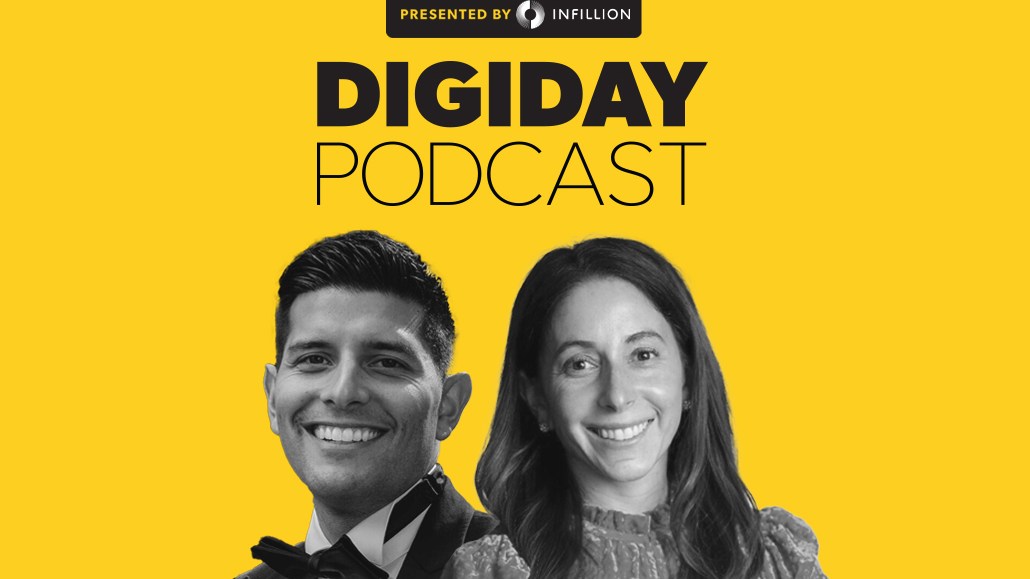Secure your place at the Digiday Media Buying Summit in Nashville, March 2-4
The Independent’s Blair Tapper & Thomson Reuters’ Josef Najm are trying to break down advertisers’ news blocks

Subscribe: Apple Podcasts • Spotify
Advertisers’ aversion to the news seems to be a neverending issue for news publishers. Tales of advertisers’ overly broad keyword blocks continue to pop up, as they did during a live recording of the Digiday Podcast at the September 2023 Digiday Publishing Summit.
“Another one we just saw was around the U.S. Open, actually, when Coco [Gauff] won and we had advertisers blocking [articles containing the word] ‘shot.’ But it’s a tennis shot, not a bullet shot,” said Blair Tapper svp for the U.S. at The Independent.
Joining Tapper on stage was Josef Najm, director of programmatic and partnerships at Thomson Reuters, who shared a similar story. Climate change-related catastrophes have dominated recent news cycles, and advertisers have created new brand-safety segments to block their ads from running against news publishers’ climate change coverage.
“It’s kind of the inverse of how advertisers are also talking about sustainability and their efforts with it. So there’s almost a little bit of hypocrisy that’s taking place there, where they’re trying to say, ‘Hey, we’re supporting something, but at the same time, we don’t want to be surrounded around the news that’s really affecting them,’” said Najm.
This issue is likely to become a bigger problem over the next year ahead of the U.S. presidential election. To get ahead of it, Tapper and Najm are trying to have more conversations with advertisers and agencies about their brand-safety efforts, such as ensuring that their keyword blocklists are updated and that ad buyers are acknowledging the nuances between news cycles and brand safety concerns.
“To sort of go back to just saying, ‘Block all this, block all that’ — it’s really sort of rudimentary when so much else has evolved so quickly, and there’s been so much more development, and it seems like this bit has stalled,” said Tapper.
Here are a few highlights from the conversation, which have been edited for length and clarity.
The origin of the brand-safety issue
Najm: This really began for me as an issue when I was on the buy side in 2016 when the election was picking up between Trump and Hillary [Clinton] and we saw advertisers concerned with running content on Breitbart.com. Next thing you know, you saw DoubleVerify is springing up with their brand safety solutions. And since then, basic keywords like “Trump” or “politics,” whatever it might be, has continued to perpetuate.
The CPM impact of unblocking high-traffic coverage
Tapper: You have to have those conversations and say, “Hey, we know this event was important to you. Are you willing to open up that keyword targeting?” Because the reality is, if [U.S. Open coverage] is [labeled] safe, we can see anywhere between three to five times [higher] CPM, but it’s also much more valuable for an advertiser.
The importance of updated keywords blocklists
Najm: It seems to be a cycle where brands will move to block things, because they need to [recalibrate] the message of how they’re going to go to market. In the case of COVID, you saw brands hit pause and say, “Ok, we want to go back to the market with community message.” They never went back to the blocks they were putting in place to say, “Now that we have this community message, how do we get it to places where people are looking for information and facts and get it back?” So those messages were going to places that weren’t necessarily new sites.
The problem with layering too many brand safety blocks
Tapper: If a client is appending 18 blocking tags and we’re applying 18 brand safety filters, there’s gonna just be one impression. That one impression is probably not enough to justify a partnership. But if you can say these are cross-cutting and X isn’t really Y and this is apples and this is oranges, it actually opens up the pipes for an actual collaboration that’s meaningful.
More in Media

From feeds to streets: How mega influencer Haley Baylee is diversifying beyond platform algorithms
Kalil is partnering with LinkNYC to take her social media content into the real world and the streets of NYC.

‘A brand trip’: How the creator economy showed up at this year’s Super Bowl
Super Bowl 2026 had more on-the-ground brand activations and creator participation than ever, showcasing how it’s become a massive IRL moment for the creator economy.

Media Briefing: Turning scraped content into paid assets — Amazon and Microsoft build AI marketplaces
Amazon plans an AI content marketplace to join Microsoft’s efforts and pay publishers — but it relies on AI com stop scraping for free.








